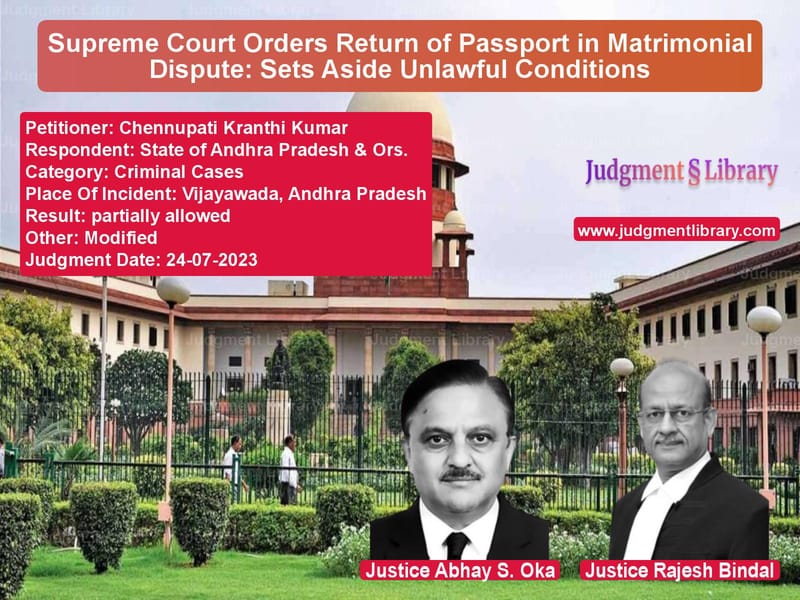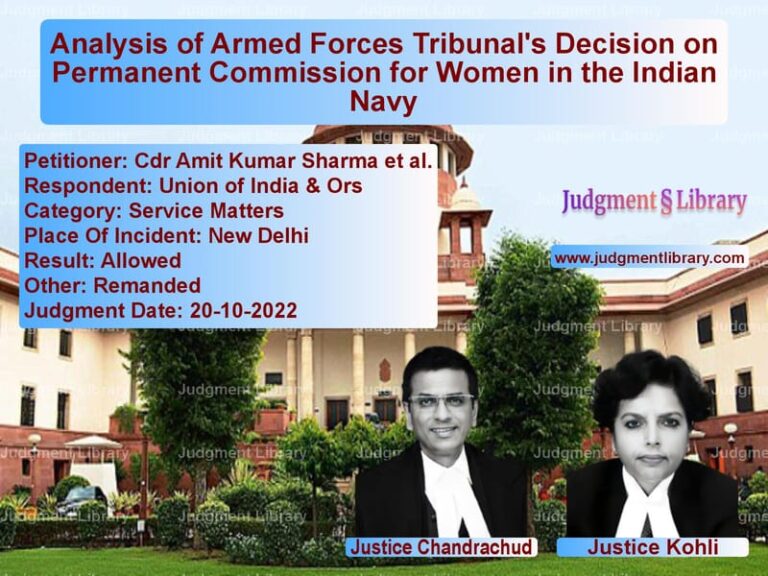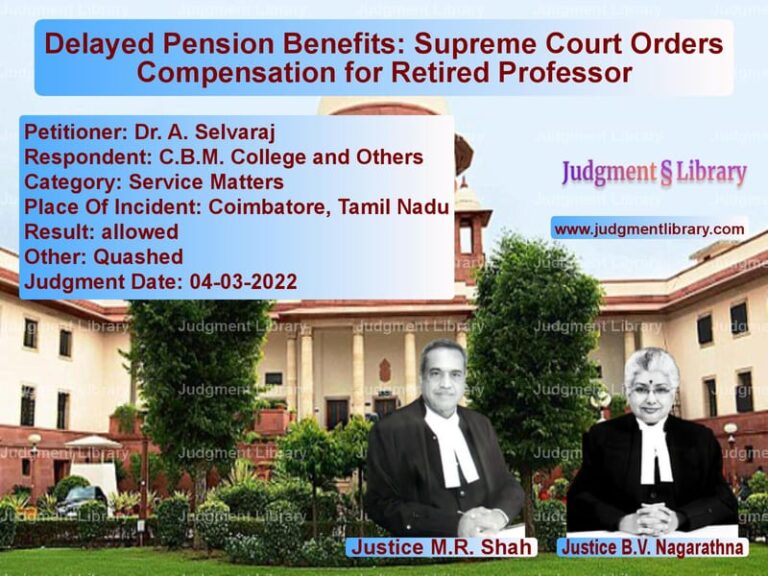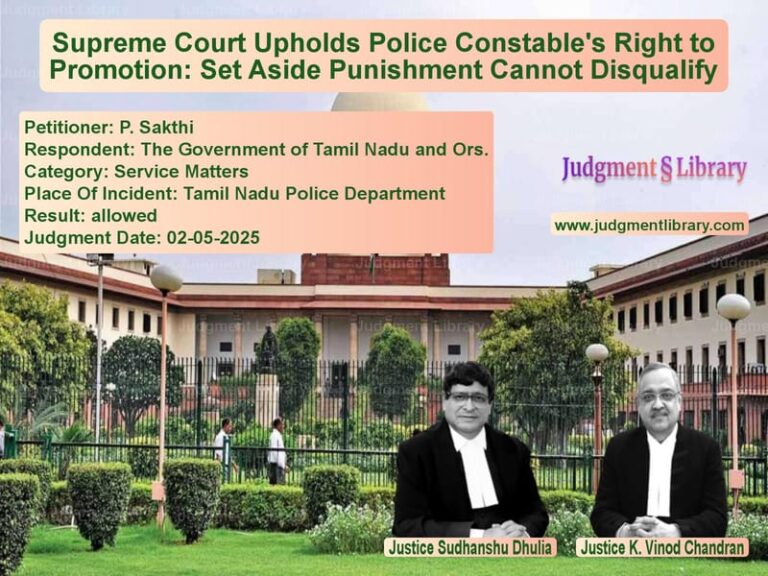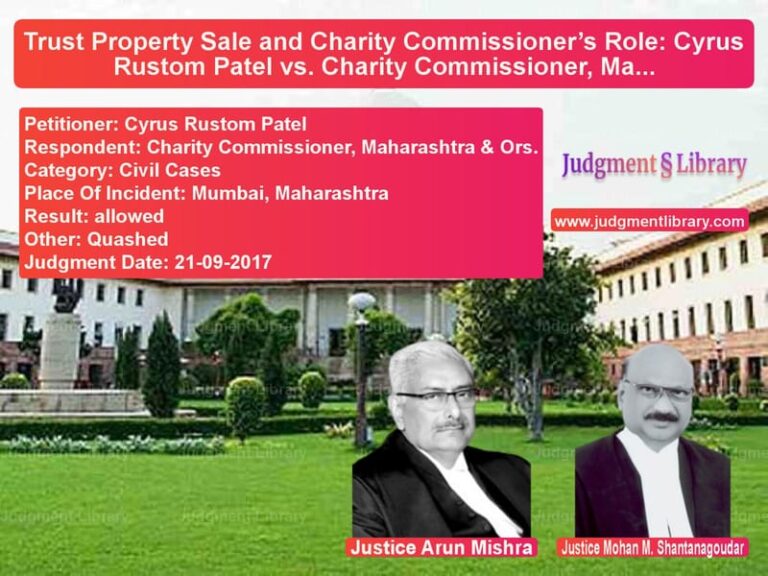Supreme Court Orders Return of Passport in Matrimonial Dispute: Sets Aside Unlawful Conditions
The case of Chennupati Kranthi Kumar v. State of Andhra Pradesh & Ors. revolves around a matrimonial dispute that resulted in a criminal case and the seizure of the appellant’s passport. The Supreme Court ruled that the passport must be returned, setting aside the condition that required him to surrender the passports of his wife and minor son. The judgment reinforces the legal principle that only the Passport Authority has the power to impound passports under the Passports Act, 1967.
Background of the Case
The appellant, Chennupati Kranthi Kumar, was accused in a case filed by his wife under Sections 498A, 403, and 406 of the IPC and Sections 3 and 4 of the Dowry Prohibition Act, 1961. During the investigation, the police seized his passport and handed it over to the Regional Passport Office in Hyderabad.
Key Developments Leading to Litigation
- January 2021: The Regional Passport Office (RPO) issued a notice stating that the police had forwarded the appellant’s passport.
- February 2021: The RPO informed the appellant that he needed court permission for the passport’s return.
- June 14, 2022: The Magistrate’s court dismissed his application for the return of the passport.
- 2023: The Andhra Pradesh High Court ordered the return of the passport but imposed conditions:
- The appellant had to deposit ₹10 lakhs in favor of his wife.
- He had to submit the original passports of his wife and minor son.
- July 25, 2023: The Supreme Court set aside the condition regarding his wife’s and son’s passports.
Arguments Before the Supreme Court
Appellant’s Arguments
Chennupati Kranthi Kumar, through his counsel, argued:
- The police had no authority to impound his passport under Section 91 of the CrPC.
- Only the Passport Authority, under Section 10(3) of the Passports Act, 1967, could impound a passport.
- He needed the passport to return to his job in the United States.
- He was not in possession of his wife’s and son’s passports, and his son’s passport was lost in 2021.
Respondent’s Arguments
The State and the complainant (his wife) countered:
- The appellant was in possession of his wife’s passport and had refused to return it.
- The ₹10 lakh deposit was necessary to ensure his compliance with the trial.
- His conduct throughout the case was objectionable, and he had suppressed facts.
Supreme Court’s Analysis and Judgment
A bench comprising Justices Abhay S. Oka and Rajesh Bindal ruled that the police and the High Court had exceeded their authority in imposing certain conditions.
Key Observations of the Court
1. Only the Passport Authority Can Impound a Passport
“The power to impound a passport vests only in the Passport Authority under the Passports Act, 1967.”
The Court ruled that the police’s act of seizing the passport was unlawful.
2. The High Court Erred in Imposing Conditions
“The condition requiring the appellant to return the passports of his wife and minor son is completely illegal.”
The Court stated that no legal provision supported such a requirement.
3. The ₹10 Lakh Deposit Was Not Challenged
“The appellant has not challenged the condition of depositing ₹10 lakhs, and hence, we do not interfere with that part of the order.”
The Court upheld the monetary condition imposed by the High Court.
4. Wife Can Apply for a New Passport
“The 4th respondent can apply for reissue of her passport, and the appellant shall cooperate.”
The Court directed the authorities to process her application without requiring proof of loss.
Final Verdict
The Supreme Court set aside the conditions requiring the appellant to return the passports of his wife and son. The ruling stated:
“The appeals succeed. The condition imposed on the appellant by the impugned order of returning the passports of the 4th respondent and the son is set aside.”
The passport must now be returned to the appellant without additional conditions.
Impact of the Judgment
This ruling has significant legal implications:
- Clarifies passport impoundment powers: Only the Passport Authority can impound passports, not the police.
- Limits arbitrary bail conditions: Courts cannot impose unreasonable conditions unrelated to the case.
- Protects individuals’ right to travel: Seized passports must be returned unless legally impounded.
- Reinforces due process: Passports cannot be withheld without lawful authority.
Conclusion
The Supreme Court’s decision in Chennupati Kranthi Kumar v. State of Andhra Pradesh reinforces that the power to impound passports rests solely with the Passport Authority. The ruling protects individuals’ right to travel and ensures that courts do not impose arbitrary conditions that lack legal justification.
Petitioner Name: Chennupati Kranthi Kumar.Respondent Name: State of Andhra Pradesh & Ors..Judgment By: Justice Abhay S. Oka, Justice Rajesh Bindal.Place Of Incident: Vijayawada, Andhra Pradesh.Judgment Date: 24-07-2023.
Don’t miss out on the full details! Download the complete judgment in PDF format below and gain valuable insights instantly!
Download Judgment: chennupati-kranthi-k-vs-state-of-andhra-prad-supreme-court-of-india-judgment-dated-24-07-2023.pdf
Directly Download Judgment: Directly download this Judgment
See all petitions in Bail and Anticipatory Bail
See all petitions in Domestic Violence
See all petitions in Legal Malpractice
See all petitions in Judgment by Abhay S. Oka
See all petitions in Judgment by Rajesh Bindal
See all petitions in partially allowed
See all petitions in Modified
See all petitions in supreme court of India judgments July 2023
See all petitions in 2023 judgments
See all posts in Criminal Cases Category
See all allowed petitions in Criminal Cases Category
See all Dismissed petitions in Criminal Cases Category
See all partially allowed petitions in Criminal Cases Category

